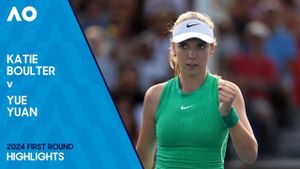The Paris 2024 Olympics, which began with much fanfare on July 26 with around 10,500 athletes hailing from 205 delegations, were marred by various controversies surrounding issues of cultural expression and inclusivity. One of the most notable discussions revolved around the French government’s decision to ban female athletes representing France from wearing hijabs during the Games.
This decision was met with significant backlash from both athletes and organizations, sparking heated debates about personal freedoms and cultural rights. The controversy came to a head during the closing ceremony when Dutch marathoner Sifan Hassan accepted her gold medal proudly wearing her hijab—a powerful message sent from the podium of the Olympic Games.
Hassan’s victory was not just about her athletic prowess but also served as a symbol of defiance against France's restrictive policies on religious attire. Her triumph was compelling—a gold medal performance coming just as the host country drew criticism for its treatment of Muslim women.
Social media lit up with praise for Hassan, highlighted by one commentator noting, ‘Sifan Hassan wearing her hijab during her gold medal crowning ceremony, after France banned females from wearing hijabs at the 2024 games. What a powerful moment!’
While Hassan celebrated her win, many observers pointed out the irony of this moment occurring in France, where such expressions of religious identity are outlawed. Another commentator reflected, ‘The last medalist of Paris 2024 is a woman who chooses to wear hijab. The irony of this being the host country, which bans hijab in sport, is incredible.’
The hijab has become more than just clothing; it represents personal identity and belief systems for many women, and its absence is felt deeply. French officials, including former Sports Minister Amelie Oudea-Castera, outlined their position emphasizing secularism but ignited debate about who faces consequences under these regulations.
Previously, some French athletes, like sprinter Sounkamba Sylla, had expressed frustration over not being allowed to wear their hijabs during the events, stating, ‘You are selected for the Olympics, organized in your country, but you can’t participate...because you wear a headscarf.’
After public outcry, adjustments were made, allowing some athletes to substitute their hijabs with caps, generating questions about the motivations behind these regulations. Observers noted the inconsistent treatment of religious garments, asking, ‘Why is it acceptable to wear a cap but not a hijab? Is the intent behind modesty lost on French officials?’
Hassan was not the only athlete making waves during the Olympics. Egyptian volleyball players Marwa Abdelhady and Doaa Elghobashy competed wearing hijabs against their opponents, respected their cultural expression, and stated, ‘Everything is OK if you want to be naked or wear hijab.’
This stark opposition to the French policy raised eyebrows across the globe. Critics noted France’s long-standing struggle with balancing secularism and cultural expression, particularly concerning Muslim women.
Demonstrations occurred where various groups protested the hijab ban, and international organizations like Amnesty International condemned these measures, asserting they negatively impacted women’s rights and inclusivity. The French authorities were accused of disenfranchising Muslim women, with critics highlighting, ‘Their proclaimed efforts at improving gender equality do not apply to Muslim women who wear religious head coverings.’
Incidents of discrimination are often worsened by preconceived notions and bias prevalent in Western societies. Critics argued these sentiments fueled the narrative of ‘freedom’ being selectively applied only to those who fit certain molds.
Such divisive policies create larger conversations about the pressures faced by athletes from various backgrounds when the line of personal expression is policed by national identities. Voices within France, like those of Rim-Sarah Alouane, spotlighted how these regulations more significantly affect minority women by invoking misogyny and selective feminism.
The absence of elevated dialogue surrounding cultural practices like the hijab, often referred to as ‘laïcité,’ can create fractures among athletes and spectators alike. Alouane noted, ‘[The hijab ban] tests the restrictions on women,’ challenging the broader principles of inclusion.
The Paris Games were expected to showcase the host city as progressive and inclusive but instead drew attention to the contradictions present within its own policies. Critics avowed, ‘It’s not about laïcité if adjustments can be made,’ indicating frustration with the selective enforcement of these ideals.
Even against this backdrop of tension, the Olympics spotlighted incredible athletic feats celebrating diversity. Simone Biles’ comeback and Hassan’s record-breaking performances intertwined sports with the politics of representation, drawing attention to athletes who transcend not only physical barriers but societal ones.
For Sifan Hassan, standing on the winner’s podium meant much more than simply earning applause; it was about challenging the restrictions imposed by her host country. The visual impact of her choice to wear the hijab during one of the most prestigious moments of her career reverberated globally.
Her act of defiance has not only reignited discussions about freedom and inclusivity for Muslim women but also set the stage for impactful conversations to emerge beyond the Olympic arena. The events at the Olympics left many viewers questioning the future of cultural expression and the evolving narrative surrounding gender, religion, and sports.
Indeed, as nations grapple with their identities, the Olympic stage has become one of resistance, hope, and resilience for athletes everywhere, particularly for those fighting against restrictive cultural norms. The Paris Games have laid the groundwork for what promises to be an evolving dialogue on the intersection of sports, faith, and identity as cultures collide on the world stage.



